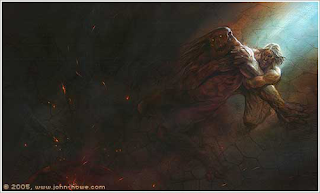 |
| The Dark,Tower, vol.7, Wikipedia |
***
A friend of mine once told me that she read S. King's The Stand every year. That made quite an impression. Lately her comment has come back to me more than once, so I decided to take a look, even though I don't really care for horror stories. It seems to me there's enough horror in the world as it is, but after reading Neil Gaiman's American Gods, which I really liked, I was game.The Stand is a big book, both in length and theme. And there were times I had to just put it down, because it was too intense. Sometimes I had to brace myself to read sections I knew would be dark and/or violent. Still, it had a relatively happy ending--the good guys survived (mostly). It had some truly interesting characters. The Dark Man, aka Randall Flagg, is pretty unforgettable.
One of the most interesting characters was the writer, Stephen King, himself. It's also of interest that "His books have sold more than 350 million copies." (Wikipedia).
Now I'm planning to read The Dark Tower, a work Mr. King considers his Magnum Opus. In preparation I bought The Complete Concordance by Robin Furth, knowing from my experience with The Stand that the details and characters in 7 volumes would be a challenge to track. In the foreword to the Compendium, King describes the process of writing a 7-volume work that spans 32 years in 'real' time, comparing it to visiting and revisiting a department store. The analogy goes like this--
Will I tell you what happens to a story when it lies fallow over such long periods of time? Will you hear? Then close your eyes and imagine a vast department store, all on one level, lit by great racks of overhead fluorescent lights. You see every kind of item under those lights—underwear and automotive parts, TVs and DVDs, shoes and stationery and bikes for the kiddies, blue jeans and mattresses (Oh look, Herbie, they’re on sale, 40% off!), cosmetics and air rifles, party dresses and picnic gear.
Now imagine the lights failing, one by one. The huge space grows darker; the goods so temptingly arrayed grow dimmer and harder to see. Finally you can hardly see your hand in front of your face.
That was the kind of room I came to when it was finally time to write The Drawing of the Three, except then the store wasn’t so big— the first volume was less than three hundred pages long, so it was actually more of a mom n pop operation, do ya not see it. I was able to light it again simply by reading over the first volume and having a few ideas (I also resurrected a few old ones; I hadn’t entirely forgotten what was in those handwritten pages, or the purpose of the tale).
Coming back to write the third volume (The Waste Lands) in the mid-eighties was harder, because the store was once again almost completely dark, and now it was much bigger. Once again I began by reading over what I’d written, taking copious notes, and filling paperback copies of the first two books with yellow highlighted passages and pink Post-it notes.
Another four years passed . . . or perhaps this time it was six. The store had once again grown dark, and by the time I was ready to write Wizard and Glass, it was bigger than ever. This time I wanted to add a whole new annex (call it Roland’s Past instead of the Bridal Shoppe). Once again out came the books— three of them, this time— the yellow highlighter, and the packets of Post-it notes.
(Furth, Robin (2012-11-06). Stephen King's The Dark Tower: The Complete Concordance, Revised and Updated (Kindle Location 52). Scribner. Kindle Edition.)
I wonder what repeatedly drew him back to working on this mammoth project. Did its state of unfinished itch? Did he dream about it? Did Roland haunt him? You may find an answer at the website.
It should be quite an adventure.
-- Marge

